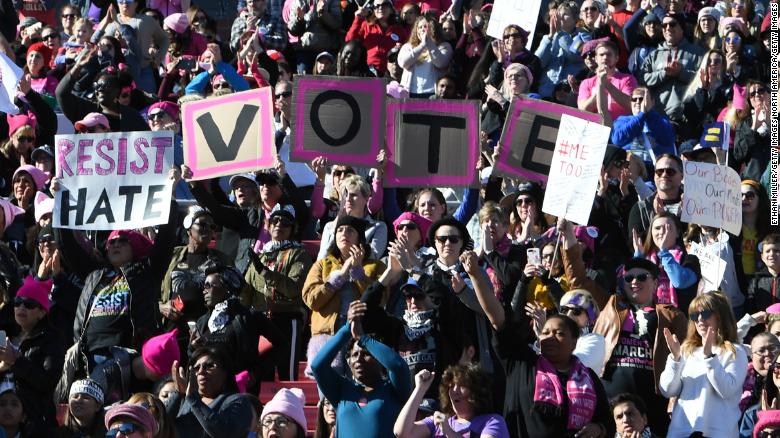Ethan Miller/Getty Images North America/Getty Images via CNN
Given the wave of controversies surrounding our current president, his administration, and the general sexual mistreatment of women, it's no surprise that the dynamics between gender and politics are a major source of interest coming into the midterms--and it seems that the partisan divide between women and men could play a huge role in the elections. Generally speaking, women are more likely to oppose Trump (and vote Democratic) while men are more favorable (and tend to vote Republican). The gender gap initially seen in the 2016 election results has carried over to his approval ratings, with the 12-point difference being twice that of his predecessors. Both Gallup and the New York Times have attributed this divide to self-interest: men who were initially wary of Trump have grown supportive based on his economic policies, while women have lost significant benefits provided by the Obama administration. NYT's Thomas B. Edsall, however, points to more fundamental differences in biology and perception--Trump seems to personify traditional displays of "alpha" behavior and masculinity, which men may find appealing in an age of social upheaval. Polls have shown that the 2018 midterm could have the widest gender gap to date, although Trump may not necessarily be a cause so much as a contributing factor in this divide.
Both the MeToo movement and the Kavanaugh confirmation have also further exacerbated partisan differences between genders. Although Democrats are placing their hopes in women's increased political involvement and mobilization (a direct response to Trump's alleged sexual misconduct and history of misogynistic remarks, as well as Clinton's loss), backlash spurred by the Kavanaugh hearings against the trend of sexual harassment/assault allegations could work in the Republicans' favor. The so-called "Kavanaugh effect" appears to be repelling both men and women from the center, in opposite directions.
Historically, the current gap between men and women seems to resemble a similar gap from Reagan's election in 1980. Back then, it was not necessarily that women were becoming more liberal, but that men were becoming more conservative. This time around, the divide seems to be going both ways. More women are running for office than ever, and only a third of women have said they plan on voting Republican in the midterms. It's clear that women will play a key role in this election, though whether they can push the Democrats to victory against a strong (and male-dominated) Republican base remains to be seen. Will we continue to see men and women divide along party lines into 2020, and how (if at all) will this affect presidential campaigns?
Sources:
Historically, the current gap between men and women seems to resemble a similar gap from Reagan's election in 1980. Back then, it was not necessarily that women were becoming more liberal, but that men were becoming more conservative. This time around, the divide seems to be going both ways. More women are running for office than ever, and only a third of women have said they plan on voting Republican in the midterms. It's clear that women will play a key role in this election, though whether they can push the Democrats to victory against a strong (and male-dominated) Republican base remains to be seen. Will we continue to see men and women divide along party lines into 2020, and how (if at all) will this affect presidential campaigns?
Sources:

1 comment:
I like how you said that "Trump seems to personify traditional displays of 'alpha' behavior and masculinity, which men may find appealing in an age of social upheaval." It's a very interesting and crucial way to analyze his popularity among white men. Unfortunately, we live in a time where gender and racial equality is seen as a threat against men, and many people still believe the senseless idea that gay couples getting married somehow threatens marriage for straight people. This became painfully obvious to me when Trump remarked on Kavanaugh and Ford, claiming that it was a scary time to be a boy; that holding rapists accountable and serving justice to women somehow hurts innocent men. Sigh.
Post a Comment